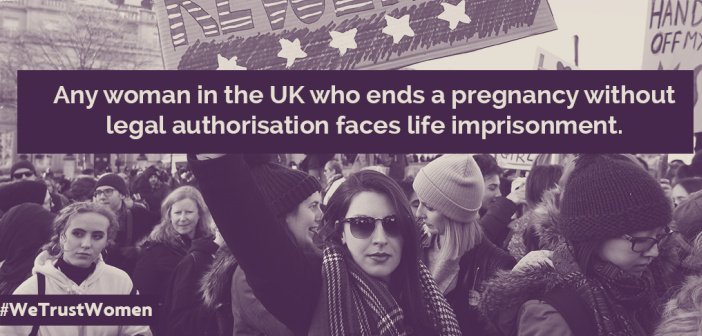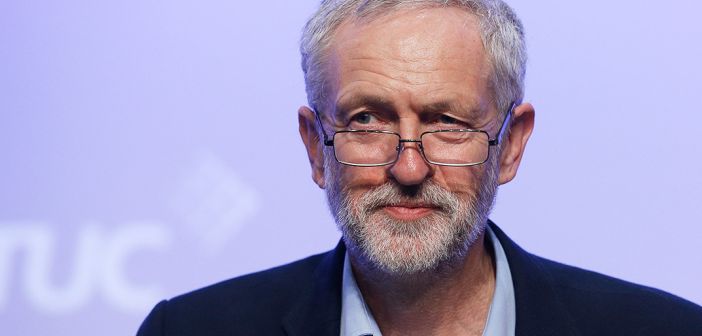Snap Elections, British Values, & Abortion Access after Brexit
The upcoming British “snap” election has often been referred to in the media as the Brexit election – with commentators arguing that issues such as the budget, the housing crisis and even migration are being considered through the lens of the UK’s relationship with the European Union. Brexit may be the topical discussion issue of most political debates, but this election is also essential in determining the future of abortion access after Brexit for women living both in Ireland and Northern Ireland.
Abortion has also increasingly become an issue for women within Britain. The “we trust women” campaign against abortion restrictions has been active in attempting to decriminalise abortion within England and Wales, eliminating all legal sanctions for women who access abortion services. The bill is currently in second reading, likely to be voted on again by Parliament during the next government – which could, of course, be affected by any changed representation in Parliament.
In the Labour manifesto for this election, the party pledged that if they manage to form a government, that they would cooperate with the Northern Irish Assembly to extend abortion rights to Northern Ireland. It is, perhaps, a bold reminder that the upcoming election will impact women travelling to the UK for abortion services. Families in Ireland and Northern Ireland have the unique and unusual situation of dependency on the liberal access to abortion in Great Britain. When branches of Britain’s busiest clinic, Marie Stopes, were temporarily unable to accommodate private clients, it became more difficult for Irish women to schedule appointments.

Even Brexit, the most hotly debated issue of the current election, could affect travel for abortion services. The government of Theresa May seems to interpret the recent vote to leave the European Union as public opposition to immigration, and plans to use it as an opportunity to greatly strengthen border controls and restrict access to the UK for both EU and non-EU citizens. While this is unlikely to legally affect women with Irish citizenship (the Common Travel Area, which allows free movement between Ireland and the UK for citizens of both states, predates the EU and is likely to continue to allow travel with minimal oversight into the future), migrant women and women without secure migration status could find the UK barred to them for termination procedures.
Ryanair founder Michael O’Leary recently cautioned that the UK’s departure from the EU could eventually mean a reduced number of flights in and out of the UK, which could affect the price of travel – making it inaccessible for low income women, women without documentations and women unable to access childcare in order to travel. The UK has long considered women’s rights and gender equality to be a core British value. Enforcement of gender equality should mean ensuring that all women in the UK, including Northern Ireland, as well as women not granted this essential human right in their own state, are able to access abortion services in the UK.
[perfectpullquote align=”right” cite=”” link=”” color=”#8D3AF9″ class=”” size=”19″]While this is unlikely to legally affect women with Irish citizenship, migrant women and women without secure migration status could find the UK barred to them for termination procedures.[/perfectpullquote]
While the Labour manifesto suggests that a Labour government would work with the Northern Irish Assembly to extend abortion services, a previously leaked draft of the manifesto had indicated that Labour intended to legislate abortion access through the Parliament at Westminster, possibly extending the 1967 Abortion Act (which regulates abortion within England and Wales) to Northern Ireland. It is unclear why Labour amended this promise to be more conciliatory towards the Northern Irish Assembly – perhaps with an eye towards support from the Northern Irish MPs in Parliament (as none of the major Northern Irish parties support increasing abortion access in Northern Ireland.) If so, it is disappointing that the Labour party has weakened its support for women as an attempt at political manoeuvring – particularly since Labour Party leader Jeremy Corbyn has an extremely progressive voting record on abortion rights.
Labour has advocated for a foreign policy based on human rights and international law; this should be completely compatible with ensuring that women who are denied abortion rights in their own countries (not only women in Ireland, but those in places such as France and Poland) should be able to access abortion rights in the UK. The Labour manifesto also fails to mention elimination of the current Abortion Act of 1967 in favour of ending all criminal sanctions for abortion services. Unfortunately, the only UK political party which has expressly offered to ensure that Northern Irish women are able to access abortion services on the NHS is the Green Party, both as a platform for candidates in England & Wales as well as for Parliamentary seats in Northern Ireland.

The devolution of abortion to Scotland has also allowed reproductive rights to be discussed more broadly amongst political parties in a Scottish context. Of course, the Westminster elections will not affect the make up of the Scottish Parliament, nor will parties campaign to change acts of its legislation. Scottish First Minister Nicola Sturgeon has, however, expressed support for possibly allowing Northern Irish women to access abortions on the Scottish NHS.
In response to an official question, First Minister Sturgeon stated that she would research allowing women resident in Northern Ireland to access abortions as part of the Scottish NHS. She has made no further response to this request and in the manifesto of her party, the Scottish National Party, it simply states that the party will not change the law regarding abortion. While it is reassuring that they would not seek to make abortion access more difficult for women in Scotland, it is disappointing that this Scottish government which advocates for equality and women’s autonomy will not promote abortion decriminalisation in both Scotland and, as part of the Westminster Parliament, for England and Wales.
Neither abortion, nor the broader topic of gender equality, has seemed to enter into the debates around the current election. Despite the likelihood that Prime Minister Theresa May will be returned to office as Britain’s second female prime minister, this is unlikely to translate into fewer criminal restrictions regarding abortion (the Conservative manifesto makes no mention of abortion.) While abortion has had little part in discussions regarding the policies of the next British government, it is essential to ensure that the manifesto, public statements and voting records of the party leaders are taken into account, and that voters make a concerted effort to hold elected officials accountable for decriminalising abortion services throughout the UK and for ensuring that women residing in Ireland and throughout Europe are able to access services as well.
